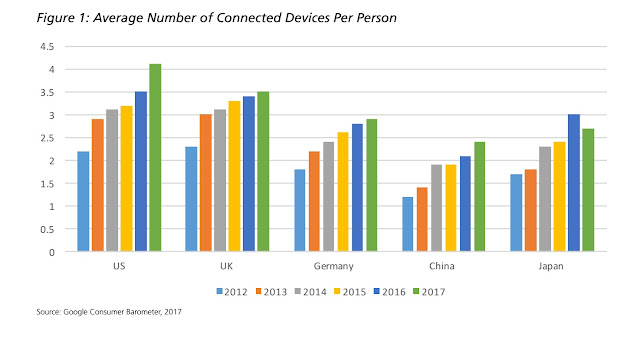It’s the biggest topic in tech, with the giants piling in to
voice-focused artificial intelligences, meaning travel brands need to sit up
and take notice finds a new free
report.
EyeforTravel’s new Can Voice Change the Way We Travel? report
advises travel brands to get ready for the expansion of voice technologies, as
although these are at an early adopter stage, they are already important parts
of the digital ecosystem and developing at a breakneck pace.
Blockbuster sales of smart speakers over the holiday periods
in both 2016 and 2017, alongside a steadily growing number of connected devices
per home across major markets in the last half decade, have demonstrated an
appetite for voice products. Even more critically than the smart speaker market,
personal assistants are being incorporated into ever more platforms, meaning a
market of billions of devices already exists.
Estimates of voice’s market share in terms of search are
harder to come by than device sales but this too is growing rapidly, nowhere
more so than China. Already, the leading players, Baidu and iFlytek, claim that
users are making hundreds of millions of daily requests through voice, allowing
them to gather vast amounts of data. This base has allowed both companies to
put together voice products that can recognise speech at accuracy rates of up
to 98%.
This growing accuracy demonstrates the rapid progress in the
field and how the technology is on the cusp of being able to transcribe human
speech perfectly. However, for travel where the real issue lies according to
the report, is not in the technology to comprehend the human voice, but the
ability to personalize the experience. Comprehension is one thing but context
and cogent answers are quite another, which will require another leap in
performance.
“When you do a normal screen based search, a whole screen of
information comes up – but on a voice based search there isn’t time for Siri,
Echo or Home to read out the whole page,” Sam Turner, sales director of
Hotelbeds Group told EyeforTravel. “A much more personalised response is
required to give you the most relevant information only, and nothing more,
otherwise it simply doesn’t work.”
Paul English, CEO of Lola Tech, believes that “ultimately
talking to your phone and saying I want a hotel tomorrow night and I am going
to be in Chicago Thursday and then having it know enough about the context and
enough about the personalization requirements that it does everything for you”
is the future.
Getting to a more personalised service will require a
concerted effort on the part of travel brands in terms of data gathering,
interpretation and presentation. Therefore, consumers conducting a full cycle
of travel research solely through voice remain some way off.
In the meantime, travel brands are finding a variety of uses
for voice products to ease the travellers’ journeys. Heathrow airport is
experimenting with smart speakers in flight screens and key locations in the
airport to help travellers with common questions. For hotels, Marriott, IHG,
Best Western and Kimpton are among the pioneers in the sector. Principally
these brands are looking at using speakers in guests’ rooms to provide services
and ease guest requests. Bill Keen, IHG’s VP of mobile solutions & digital
guest experience, reported that they had implemented Alexa into and enthused
about its further potential: “Voice is sexy again. I do believe that’s the next
interface for us.” For luxury hotel brand Edwardian, they have gone a step
further and developed out their self-developed chatbot so now it has been
enabled to speak to guests and the leadership team is looking at their own in-room
speaker tech.
For more on the topic of voice and its impact on the travel
industry, click here
to download the complete report for free.




